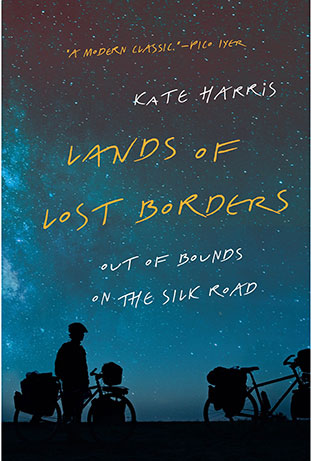Like many a twenty-first century travelogue, Lands of Lost Borders is as much about the inner journey of the author as the outer, physical, map-plotted journey that she follows. However, there are no traces of pasta, yoga, or steamy Balinese love affairs here. Kate Harris and her travel companion, a childhood friend named Mel, push themselves far beyond the comfort zones of even the fairly intrepid traveler, including this reviewer, whose adventures bussing from Kathmandu, Nepal to Leh, India pale in comparison to Harris’s experience cycling this same route.
Lands of Lost Borders: A Journey on the Silk Road recounts Harris and Mel’s cycle adventure from Istanbul, Turkey to Ladakh, India, passing through Georgia, Azerbaijan, Kazakhstan, Uzbekistan, Tajikistan, China, Tibet, and Nepal on the way. But, as Harris sets out to demonstrate, the borders we are used to seeing on maps are artificial. Human-drawn borders disrupt but cannot entirely eliminate the natural flow of rivers, glaciers, forests, and even nomadic people, who continue to defy them. She writes: “Unlike political frontiers, so crisp and martial – precisely here is Tajikistan, exactly there is Afghanistan – ecological borders are more often murky, a mosaic of give-and-take: the thinning of greenery above the treeline at Zorkul, say, or the interlude of dusk that drew marmots from their dens.”
But, as Harris finds, however artificial the lines on a map may be, they do contain potent meaning and have tangible effects on peoples and ecosystems. On traveling to South Korea (a trip that pre-dated the cycling adventure of this book), she visited the demilitarized zone (DMZ) between the Koreas and was amazed to find that this 160-mile long, 2.5-mile wide strip of land without human touch has returned to wilderness. Animals and plants that can no longer be found to the north or south, at least not to any large degree, thrive in the DMZ. It was this discovery that prompted her thinking about wilderness and nationalism, and how wilderness areas may serve to eliminate nationalism in the effort to conserve common resources.
Harris was drawn to her biking expedition through her disappointment with institutionalized education, which led her to drop out of her PhD program at MIT. Obsessed with Mars exploration from a young age, she sees all that is noble in the act of travel, exploration, and documentation in the name of science. But over the course of her travels, her naiveté is replaced by the devastating realization that exploration, however good the intentions, is co-opted by nationalism and military control, and can lead to the destruction of that being explored. While astronauts famously pointed out that borders between countries cannot be seen from space, it was loyalty to arbitrary lines that sparked the Cold War and launched humans to the moon in the first place. As Harris writes:
I lay in my sleeping bag, aching all over, and fervently hoped humans never made it to Mars. We didn’t deserve a new world; we’d just wreck it all over again. As a kid I’d genuinely believed that the discovery of alien life, whether sentient being or microbes, would change lives, incite a revolution near-holy in its repercussions. At the very least people would be kinder to each other, knowing we’re all of a kind, earthlings every one … Now I wasn’t convinced. Discovering extraterrestrial life wouldn’t change a thing, just as learning to fly didn’t lift us higher as people.
Lands of Lost Borders concludes that it is the journey, rather than the destination, that counts. Harris does not – indeed, cannot – fully map the places she passes through, just as she does not find answers about how to turn the act of exploration into a noble rather than conquering cause. But her apparent drive to name and label gives way to a celebration of human connections with each other, and with the natural world. However much we may refuse to see our common humanity and continue to destroy the only place we can call home, our fates as humans on earth are inextricably tied.
We don’t have a paywall because, as a nonprofit publication, our mission is to inform, educate and inspire action to protect our living world. Which is why we rely on readers like you for support. If you believe in the work we do, please consider making a tax-deductible year-end donation to our Green Journalism Fund.
DonateGet four issues of the magazine at the discounted rate of $20.